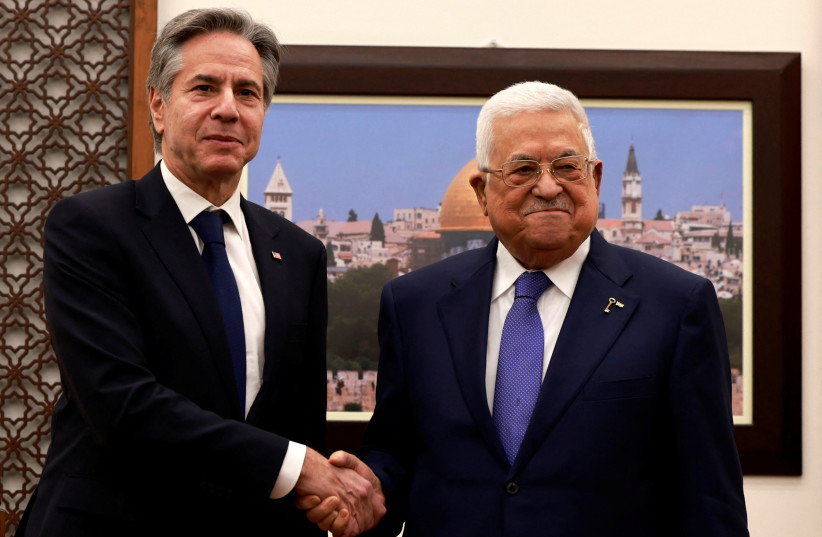US, Arab allies look to unveil two-state peace plan
The United States and its moderate Arab allies are working on a plan for a two-state resolution to the Israeli-Arab conflict based on a clear timeline, which they had hoped to unveil in the coming weeks ahead of the Ramadan holiday period that begins on March 10, according to a report in The Washington Post.
Immediately upon hearing of the report Finance Minister Bezalel Smotrich (Religious Zionist Party) said he planned to ask the security cabinet to issue a declaration against a Palestinian state when it met later today.
“We will in no way agree to this plan, which actually says that the Palestinians deserve a reward for the terrible massacre they did to us — a Palestinian state with Jerusalem as its capital,” Smotrich said.
“The message is that it pays very well to massacre Israeli citizens. A Palestinian state is an existential threat to the State of Israel as was proven on October 7, Kfar Saba will not be Kfar Gaza!,” he emphasized.
“I will demand today at the security cabinet meeting that it make a clear and unequivocal decision stating that Israel opposes the establishment of a Palestinian state and the imposition of sanctions on over half a million settlers.”
“I expect clear support from Prime Minister [Benjamin] Netanyahu, [Minister] Benny Gantz, [Minister] Gadi Eisenkot and all the ministers,” Smotrich stated.
Those working on the plan with the US include Egypt, Qatar, Jordan, Saudi Arabia, and the United Arab Emirates. All the countries involved, except for Saudi Arabia, have diplomatic relations with Israel.
The Biden administration has sought to normalize ties between Israel and Saudi Arabia, as part of a security pact it wants to formalize with Riyadh. Saudi Arabia has insisted that Palestinian statehood must be part of such a deal.
Both US President Joe Biden and Jordan’s King Abdullah spoke about the importance of a two-state resolution to the conflict when they met at the White House earlier this week.
At their joint press conference, Biden said, “Together, we will keep working to complete what has — what we started: to integrate the region, to bring about peace between Israel and all its Arab neighbors, including a Palestinian state. That effort was already underway before the October 7th attacks. It’s even more urgent today.”
Abdullah said, “We must together, along with Arab partners and the international community, step up efforts to reach a ceasefire in Gaza and immediately start working to create a political horizon that leads to a just and comprehensive peace on the basis of the two-state solution.”
The King clarified that this meant “an independent, sovereign, and viable Palestinian state with East Jerusalem as its capital but living side by side with Israel in peace and security.”
US Secretary of State Antony Blinken spoke of the importance of a “time-bound, irreversible” path to a Palestinian state when he was in Israel last Thursday.

The Washington Post explained that those involved in this process had hoped to use the diplomatic space, that could be made possible through a hostage deal with an extended pause to the Israel-Hamas war, to put forward a two-state option.
The process would begin already as part of a day-after plan for Gaza with an interim Palestinian government.
US and Arab officials, according to the Post, fear that failure to achieve a hostage deal would make it impossible to create a diplomatic space for such a plan. A two-state plan would be future thwarted by the anti-Israel emotions generated as a result of a potential IDF military operation in Rafah.
Netanyahu’s reaction to the developments
Prime Minister Benjamin Netanyahu has been blunt about his opposition to Palestinian statehood, particularly in all of Gaza and the West Bank. He insisted that Israeli settlements in the West Bank must not be uprooted, Jerusalem must remain united under Israeli sovereignty, and that the IDF must retain security control of Gaza and the West Bank.
In an interview with ABC on Sunday, Netanyahu said, “Everybody who talks about a two-state solution, I ask what do you mean by that?
“Should the Palestinians have an army? Can they sign a military pact with Iran? Can they import rockets from North Korea and other deadly weapons? Should they continue to educate their children about terrorism and annihilation – of course not.
“The substance in a future peace agreement, which everyone says is far off, is that the Palestinians should have the powers to govern themselves, but none of the powers to threaten Israel.”
“The most important power that has to remain in Israel’s hands is the overriding security control in the area west of the Jordan, which includes Gaza. Otherwise, history has shown that terrorism comes back,” he said.
At the House of Lords this week British Foreign Secretary David Cameron said that officials from European and Arab countries planned to meet on the sidelines of the Munich Security Conference this weekend, possibly together with Blinken, to discus the Israeli-Palestinian conflict.
Among those attending the Munich Security Conference will be Blinken and Israeli President Isaac Herzog.





Comments are closed.